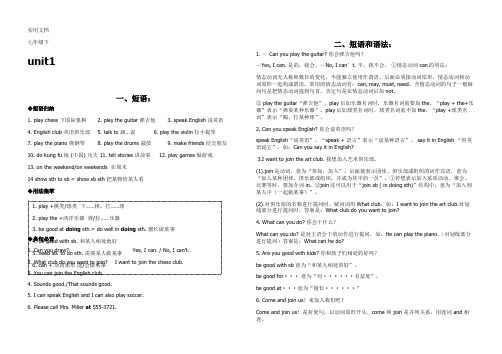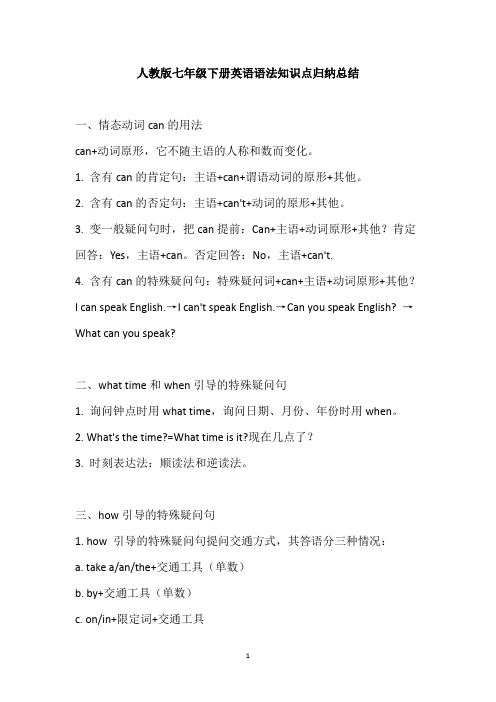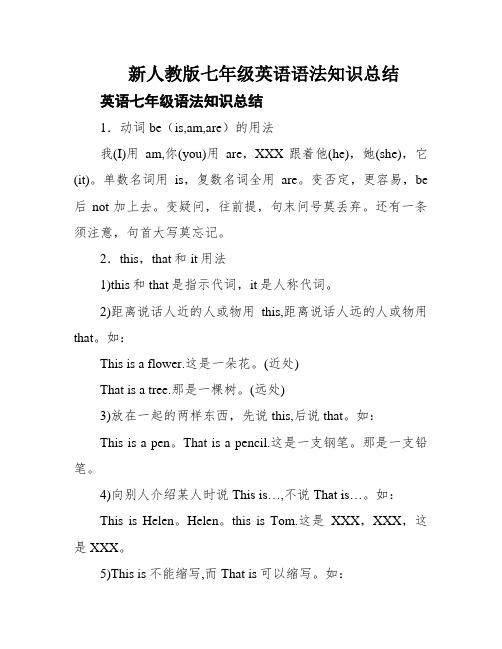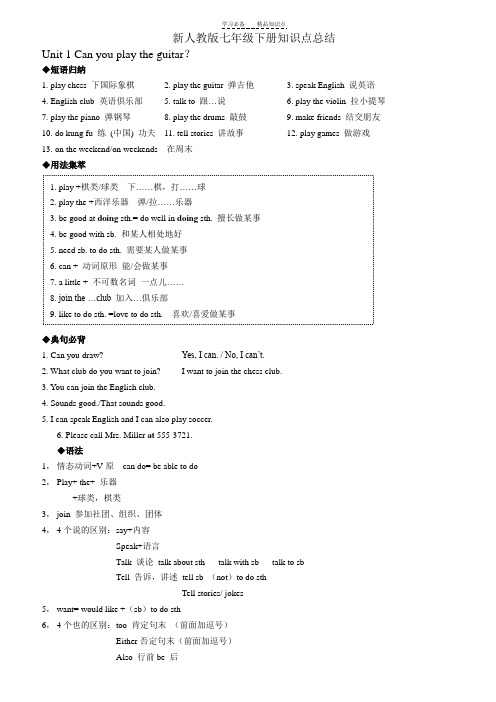人教版七年级下册英语动词用法小结
人教版七年级英语下册各知识点归纳总结

七年级下unit1一、短语:◆短语归纳1. play chess 下国际象棋2. play the guitar 弹吉他3. speak English 说英语4. English club 英语俱乐部5. talk to 跟…说6. play the violin 拉小提琴7. play the piano 弹钢琴8. play the drums 敲鼓9. make friends 结交朋友10. do kung fu 练 (中国) 功夫 11. tell stories 讲故事 12. play games 做游戏13. on the weekend/on weekends 在周末14 show sth to sb = show sb sth 把某物给某人看◆用法集萃◆典句必背1. Can you draw? Yes, I can. / No, I can’t.2. What club do you want to join? I want to join the chess club.3. You can join the English club.4. Sounds good./That sounds good.5. I can speak English and I can also play soccer.6. Please call Mrs. Miller at 555-3721.二、短语和语法:1. — Can you play the guitar? 你会弹吉他吗?—Yes, I can. 是的,我会。
—No, I can’t. 不,我不会。
①情态动词can的用法:情态动词无人称和数目的变化,不能独立使用作谓语,后面必须接动词原形,情态动词和动词原形一起构成谓语。
常用的情态动词有:can, may, must, need。
含情态动词的句子一般疑问句是把情态动词提到句首,否定句是在情态动词后加not。
人教版七年级下册英语语法知识点归纳总结

人教版七年级下册英语语法知识点归纳总结一、情态动词can的用法can+动词原形,它不随主语的人称和数而变化。
1. 含有can的肯定句:主语+can+谓语动词的原形+其他。
2. 含有can的否定句:主语+can't+动词的原形+其他。
3. 变一般疑问句时,把can提前:Can+主语+动词原形+其他?肯定回答:Yes,主语+can。
否定回答:No,主语+can't.4. 含有can的特殊疑问句:特殊疑问词+can+主语+动词原形+其他?I can speak English.→I can't speak English.→Can you speak English? →What can you speak?二、what time和when引导的特殊疑问句1. 询问钟点时用what time,询问日期、月份、年份时用when。
2. What's the time?=What time is it?现在几点了?3. 时刻表达法:顺读法和逆读法。
三、how引导的特殊疑问句1. how 引导的特殊疑问句提问交通方式,其答语分三种情况:a. take a/an/the+交通工具(单数)b. by+交通工具(单数)c. on/in+限定词+交通工具---How do you go to school every day?---I take a bus to go to school every day./I go to school by bus every day./I go to school on the bus every day.2. how far 用来提问距离,多远,其答语分为两种:(1)用长度单位表示:It is five kilometers.(2)用时间表示:It’s twenty minutes’walk.3. how long 用来提问时间,意为多久回答常用“for+段时”。
新人教版七年级英语语法知识总结

新人教版七年级英语语法知识总结英语七年级语法知识总结1.动词be(is,am,are)的用法我(I)用am,你(you)用are,XXX跟着他(he),她(she),它(it)。
单数名词用is,复数名词全用are。
变否定,更容易,be 后not加上去。
变疑问,往前提,句末问号莫丢弃。
还有一条须注意,句首大写莫忘记。
2.this,that和it用法1)this和that是指示代词,it是人称代词。
2)距离说话人近的人或物用this,距离说话人远的人或物用that。
如:This is a flower.这是一朵花。
(近处)That is a tree.那是一棵树。
(远处)3)放在一起的两样东西,先说this,后说that。
如:This is a pen。
That is a pencil.这是一支钢笔。
那是一支铅笔。
4)向别人介绍某人时说This is…,不说That is…。
如:This is Helen。
Helen。
this is Tom.这是XXX,XXX,这是XXX。
5)This is不能缩写,而That is可以缩写。
如:This XXX.这是一辆自行车。
那是一辆轿车。
6)打电话时,介绍自己用this,询问对方用that。
如:Hello。
Is that Miss Green?喂,是XXX小姐吗?Yes。
this is。
Who’s that?是的,我是,你是谁?注意:虽然汉语中使用“我”和“你”,但英语中打电话时绝不可以说:I am…。
Are you…?/Who are you?7)在回答this或that作主语的疑问句时,要用it代替this或that。
如:①—Is this a XXX?这是条记本吗?—Yes。
it is.是的,它是。
②—What’s tha t?那是甚么?—It’s a kite.是只鹞子。
3.these和those用法this。
that。
these和those是指示代词,these是this的复数形式,指时间,距离较近的或下面要提到的人或事;those是that 的复数形式,指时间、距离较远或前面已经提到过的人或事物。
英语七年级下册人教版一般将来时和一般现在时两种时态笔记概念构成动词形式

英语七年级下册人教版一般将来时和一般现在时两种时态笔记概念构成动词形式1.一般现在时(1)结构:当主语是第三人称单数时,谓语动词用第三人称单数形式。
(2)动词的第三人称单数形式变化规则如下:①直接加s。
如:work-works。
②以“辅音字母+y”结尾的词,先变y为i,再加es。
如:carry-carries;cry-cries;try-tries;study一studies。
③以s,x,o,ch,sh结尾的词加es。
如:wash-washes;teach-teaches;go-goes;pass一passes;fix-fixes。
④特殊:have has;am/are is(3)用法:①表示习惯性的动作。
常与seldom,often,usually,always,sometimes,today,every day,once a week,every five minutes,on Sundays等时间状语连用。
如:I go to school at seven every day.我每天七点去上学。
②表示普遍真理和客观事实。
如:The earth goes around the sun.地球绕着太阳转。
③表示在现里所发生的一个动作。
如:Here comes the bus.公共汽车来了。
④在时间和条件状语从句中代替一般将来时。
如:I'll go shopping with my mother if sheis free tomorrow.如果明天我妈妈有空,我将和她去购物。
3.一般将来时(1)结构:助动词shall/will+动词原形;be going to+动词原形(2)用法:①表示将要发生的动作或状态,常用的时间状语有later(on),soon,in a month(in+时间段),next time,from now on,tomorrow等。
如:I shall be eighteen years old next year.明年我就18岁了。
知识点初一常用动词用法总结

知识点初一常用动词用法总结初一常用动识点总结知识点1:动词的基本形式动词是一个句子中最主要的成分,用来表示动作或状态。
动词的基本形式指的是动词原形,常以动词原形作为主语、谓语或宾语。
知识点2:动词的时态动词的时态主要分为简单时态、进行时态和完成时态。
1. 简单时态a) 一般现在时:表示经常性、习惯性的动作或状态,常与副词always、often、usually等连用。
例句:I often go to the park on weekends.(我经常在周末去公园。
)b) 一般过去时:表示过去某个时间发生的动作或存在的状态。
例句:She watched a movie yesterday.(昨天她看了一部电影。
)c) 一般将来时:表示将来即将发生的动作或存在的状态。
例句:We will have a party next week.(下周我们将举办一场派对。
)2. 进行时态a) 现在进行时:表示现在正在进行的动作。
例句:She is playing basketball now.(她正在打篮球。
)b) 过去进行时:表示过去某个时间正在进行的动作。
例句:They were studying English at that time.(他们那时正在学习英语。
)c) 将来进行时:表示将来某个时间正在进行的动作。
例句:I will be sleeping when you arrive.(当你到达时,我将会正在睡觉。
)3. 完成时态a) 现在完成时:表示过去发生的动作对现在造成的影响或仍然持续的状态。
例句:He has finished his homework.(他已完成作业。
)b) 过去完成时:表示过去某个时间之前已经完成的动作。
例句:She had already left when I arrived.(当我到达时,她已经离开了。
)c) 将来完成时:表示将来某个时间之前已经完成的动作。
例句:I will have read the book by tomorrow.(到明天前,我将会读完这本书。
新人教版七年级下册英语知识点总结

新人教版七年级下册知识点总结Unit 1 Can you play the guitar?◆短语归纳1. play chess 下国际象棋2. play the guitar 弹吉他3. speak English 说英语4. English club 英语俱乐部5. talk to 跟…说6. play the violin 拉小提琴7. play the piano 弹钢琴8. play the drums 敲鼓9. make friends 结交朋友10. do kung fu 练(中国) 功夫11. tell stories 讲故事12. play games 做游戏13. on the weekend/on weekends 在周末◆用法集萃1. play +棋类/球类下……棋,打……球2. play the +西洋乐器弹/拉……乐器3. be good at doing sth.= do well in doing sth. 擅长做某事4. be good with sb. 和某人相处地好5. need sb. to do sth. 需要某人做某事6. can + 动词原形能/会做某事7. a little + 不可数名词一点儿……8. join the …club 加入…俱乐部9. like to do sth. =love to do sth. 喜欢/喜爱做某事◆典句必背1. Can you draw? Yes, I can. / No, I can’t.2. What club do you want to join? I want to join the chess club.3. You can join the English club.4. Sounds good./That sounds good.5. I can speak English and I can also play soccer.6. Please call Mrs. Miller at 555-3721.◆语法1,情态动词+V原can do= be able to do2,Play+ the+ 乐器+球类,棋类3,join 参加社团、组织、团体4,4个说的区别:say+内容Speak+语言Talk 谈论talk about sth talk with sb talk to sbTell 告诉,讲述tell sb (not)to do sthTell stories/ jokes5,want= would like +(sb)to do sth6,4个也的区别:too 肯定句末(前面加逗号)Either否定句末(前面加逗号)Also 行前be 后As well 口语中(前面不加逗号)7,be good at+ V-ing=do well in 擅长于be good for 对…有益(be bad for对…有害)be good to 对…友好(good 可用friendly,nice,kind替换)be good with和…相处好=get on/ along well with8,特殊疑问句的构成:疑问词+一般疑问句9,How/ what about+V-ing …怎么样?(表建议)10,感官动词(look, sound, taste, smell, feel)+adj/ like11,选择疑问句:回答不能直接用Yes或者No,要从中选择一个回答12,students wanted for school show(wanted表示招募,含有被动意义)13,show sth to sb=show sb sth give sth to sb=give sb sth14,help sb (to)do sthHelp sb with sthWith sb’s help= with the help of sbHelp oneself to 随便享用15,be busy doing sth/ be busy with sth16,need to do sth17,be free= have time18,have friends= make friends19,call sb at +电话号码20,on the weekend= on weekends21,English-speaking students 说英语的学生(带有连词符,有形容词性质)22,do kung fu表演功夫◆话题写作Dear Sir,I want to join your organization (组织) to help kids with sports, music and English. My name is Mike. I am 15 years old. I’m a student in No. 1 Middle school. I can play the guitar well. I can sing many songs. I can swim and speak English well, too. I think I can be good with the kids. I also do well in telling stories.I hope to get your letter soon.Yours,MikeUnit 2 What time do you go to school?1,问时间用what time或者whenAt+钟点at 7 o’clock at noon/ at night(during/ in the day)On+ 具体某天、星期、特指的一天on April 1st on Sunday on a cold winter morningIn +年、月、上午、下午、晚上2,时间读法:顺读法逆读法:分钟≤30用past five past eight(8:05)half past eight(8:30)分钟>30用to a quarter to ten(9:45)整点用…o’clock 7 o’clock(7:00)3,3个穿的区别:wear 表状态,接服装、手套、眼镜、香水等Put on 表动作,接服装Dress 表动作,接sb./ oneself get dressed穿衣3,感叹句:How+adj.+主谓!How+adj.+a/an +n单+主谓!What+ a/an +adj.+ n单+主谓!What+ adj.+ n复/ 不可数+主谓!4,from…to…5,be/ arrive late for6,频度副词(行前be 后)always usually often sometimes seldom hardly never7,一段时间前面要用介词forfor half an hour for five minutes8,eat/ have…for breakfast/ lunch/ dinner/ supper9,either…or10,a lot of=lots of11,it is +adj.+for sb. +to do sth. (adj.修饰to do sth.)It is important for me to learn English.it is +adj.+of sb. +to do sth. (adj.修饰sb.)It is kind/ friendly/ nice of you to help me.◆用法集萃1. at + 具体时间点在几点(几分)2. eat breakfast/ lunch/dinner 吃早饭/午饭/晚饭3. thirty\half past +基数词……点半4. fifteen\a quarter to +基数词差一刻到……点5. take a/an +名词从事……活动6. from …to … 从……到……7. need to do sth 需要做某事◆短语归纳1. what time 几点2. go to school 去上学3. get up 起床4. take a shower 洗淋浴5. brush teeth 刷牙6. get to 到达7. do homework 做家庭作业8. go to work 去上班9. go home 回家10. eat breakfast 吃早饭11. get dressed 穿上衣服12. get home 到家13. either…or… 要么…要么… 14. go to bed 上床睡觉15. in the morning/ afternoon/ evening 在上午/下午/晚上16. take a walk 散步17. lots of=a lot of 许多,大量18. radio station 广播电台19. at night 在晚上20. be late for=arrive late for 迟到◆典句必背1. What time do you usually get up? I usually get up at six thirty.2. That’s a funny time for breakfast.3. When do students usually eat dinner? They usually eat dinner at a quarter to seven in the evening.4. In the evening, I either watch TV or play computer games.5. At twelve, she eats lots of fruit and vegetables for lunch.6. She knows it’s not good for her, but it tastes good.7. Here are your clothes.◆话题写作主题:谈论日常作息习惯My School DayI am a student. I usually get up at seven, and I eat breakfast at seven thirty. Then I go to school at eight. School starts at eight thirty. I eat lunch at twelve. I go home at 17:00. I often eat dinner at 19:00 and then play the piano. I do my homework at 20:00. At 22:00, I go to bed.Unit 3 How do you get to school?1,疑问词How 如何(方式)how long 多长(时间)答语常用“(For/ about +)时间段”how far多远(距离)答语常用“(It’s +)数词+miles/ meters/ kilometers”how often多久一次(频率)答语常用“Always/ often/ every day/…”或“次数+时间”等表频率的状语How soon多快,多久以后,常用在将来时中。
期末复习人教版英语七年级下册单元重点知识点语法汇总
人教版七年级下册-单元重点语法汇总U1情态动词can的用法can是情态动词,意为“能,会”,表示某人或某物具备的能力,还可用来提出请求,没有人称和数的变化,后面直接接动词原形。
下面学习情态动词can的常见用法。
1.表示“能力”,意为“能,会”。
例句:I can speak English.我会讲英语。
2.表示“请求”或“许可”。
例句:Can you help me with my Chinese?你能帮我学汉语吗?You can go to the park after you finish your homework.你做完作业后可以去公园。
3.含有情态动词can的肯定句变否定句时,需在can后加not,其缩写形式为can’t;变疑问句时,情态动词can直接放在句首,构成一般疑问句。
例句:I can sing English songs.我会唱英文歌。
(肯定句)→I can’t sing English songs.我不会唱英文歌。
(否定句)Yao Ming can play basketball.姚明会打篮球。
→Can Yao Ming play basketball?姚明会打篮球吗?(一般疑问句)4.对Can…问句的回答可以用下面几种形式:对询问能力的问句的回答可以说“Yes,…can.”或“No,…can’t.”,表示对能力的肯定或否定;对表示请求的问句的回答可以说“OK./All right.”,表示同意对方的请求。
也可用certainly或sorry来回答。
用certainly作肯定回答,语气更肯定;用sorry作否定回答,语气则更委婉、客气。
例句:—Can you speak English?你会说英语吗?—Yes,I can.是的,我会。
—Can I see your pencil-box,please?请问,我可以看一下你的铅笔盒吗?—All right./Certainly.Here you are.可以。
(完整版)人教版英语七年级下册第四单元短语语法知识点总结及练习
(完整版)人教版英语七年级下册第四单元短语语法知识点总结及练习Unit 4Don’t eat in class【短语归纳】1.on time 准时,按时2. listen to …听……3. in class 在课上4. be late for 做……迟到5. have to 不得不6. be quiet安静7. go out外出8. do the dishes 清洗餐具9. make breakfast 做早饭10. make (one’s) bed 铺床11. be noisy 吵闹12. keep one’s hair short 留短发13. play with sb. 和某人一起玩14. play the piano 弹钢琴15. have fun 玩得高兴16. make rules 制订规则【用法集萃】1.Don’t + 动词原形+其他,不要做某事。
2.help sb. (to) do sth. 帮助某人做某事3.too many + 可数名词复数太多的……4.practice doing sth. 练习做某事5. be strict with sb. 对某人要求严格6. be strict in sth. 对某事要要求严格7. leave sth sp. 把某物忘在某地8. keep + 宾语+形容词使……保持某种状态9. learn to do sth. 学会做某事10. have to do sth. 不得不做某事┃语法探究┃┃.祈使句定义:用于表达命令、请求、劝告、警告、禁止等的句子叫__________句。
时态:使用______________时态。
结构:动词原形+其他成分+please. 否定祈使句在动词原形前面加__________ 。
如:Be quiet in the classroom, please.在教室里请保持安静。
Don't fight. 不要打架┃.情态动词have to 和must1.情态动词have to和must都表示“__________”的意思。
人教版英语七年级下册unit1+2核心考点归纳(语法+词汇+短语+重点句子)
人教版七年级下册unit1+2核心考点及语法归纳【unit 1语法】一、情态动词can的基本用法情态动词can有一定的词义,但不能独立存在,它必须与动词原形一起构成谓语。
can没有人称和数的变化。
其具体用法如下:1.表示"能、会",指脑力或体力方面的"能力"。
例如:I can speak English.我会讲英语。
Jim can swim but I can't.吉姆会游泳,但我不会。
2.表示"可能",常用于否定句或疑问句中,指某种可能性。
例如:Han Mei can't be in the classroom.韩梅不可能在教室里。
Can he come here today, please?请问他今天能到这里来吗?3.表示"可以",常用于口语中,指许可或请求做某事。
例如:Can I have a cup of tea, please?请问我可以喝一杯茶吗?You can go out.你可以出去了?二、情态动词的注意事项1. can的口诀:情态动词can、can、can,动词原形跟后面。
变疑问can提前,变否定not后面加上去。
主语人称单复数,情态动词不能变。
2. 情态动词can可以引导肯定句和疑问句。
肯定句:主语+ can + 动词原形+ 其他成分疑问句:can + 主语+ 动词原形+ 其他成分3.can 引导的肯定句变为疑问句的方法:(一调二改三问号)can 提前,首字母大写。
(一调)肯定句中主语在变成疑问句时的变化。
(二改)如:肯定句:You can feed the animals.你可以喂动物。
疑问句:Can I feed the animals?我能喂动物吗?在句尾后面加问号。
(三问号)4. Can的一般疑问句回答:肯定回答:Yes,主语(必须人称代词)+ can.否定回答:No,主语(必须人称代词)+ can not (can’t)/mustn’t. Yes 或no 后要使用逗号,除了I 以外,其他人称都要小写。
人教版七年级下册英语Unit 4 知识点语法归纳总结
Unit 4 Don’t eat in class.1.短语归纳2.典句必背3.用法集萃(1)Don’t arrive late for class. 不要上课迟到❖arrive in❖arrive at(2)You must be on time. 你必须准时。
❖on time是固定搭配,意为“按时;准时”。
例:Don’t worry. The train will arrive on time. 别担心。
火车会准时到达的。
❖常见的time短语(3)Don’t listen to music in class. 不要上课时听音乐牛刀小试—Do you like the songs by Taylor?一Yes. Country music ______ nice and full of feelings.A. SoundsB.listensC. hearsD. looks(4)This is very important. 这是很重要的❖important作形容词,意为“重要的”。
如:The first lesson is very important. 第一课是很重要的❖反义词:unimportant adj. 不重要的❖派生词:importance n. 重要;重要性(5)Can we bring music players to school? 我们可以把音乐播放器带到学校里来吗?❖bring作动词,意为“带来;拿来”例:Don’t forget to bring your homework here. 不要忘记把你的家庭作业带过来❖辨析bring, take, carry和get牛刀小试Don’t forget _____ your photos here when you come to school.A.bringingB. to takeC. takingD. to bring(6)Oh, and we also have to be quiet in the library. 哦,我们在图书馆里还必须保持安静❖quiet作形容词,意为“安静的”,可以用来修饰人,也可以用来形容地点或场所等。
- 1、下载文档前请自行甄别文档内容的完整性,平台不提供额外的编辑、内容补充、找答案等附加服务。
- 2、"仅部分预览"的文档,不可在线预览部分如存在完整性等问题,可反馈申请退款(可完整预览的文档不适用该条件!)。
- 3、如文档侵犯您的权益,请联系客服反馈,我们会尽快为您处理(人工客服工作时间:9:00-18:30)。
2015年七年级英语动词用法小结一、以下动词或词组后面用动词不定式,即to do something1.would like to do something= want to do something 想要做某事2.hope/start/begin/nee d to do something 希望/开始/需要做某事3.疑问词how+ to do something 如何做某事4.be glad/nice/happy/sorry to do something 高兴/抱歉做某事5.It is interesting/fun to do something. 做某事很有趣。
6.It is time to do something. 该做某事了7.It is time for sb. to do something. 该某人做某事了。
8.have (no) time to do something (没)有时间做某事9.It takes sb. some time/money to do something.花费某人一些时间/金钱做某事。
10.help sb. (to ) do something 帮助某人做某事(注意:这里的to可以省略)11.seem to to do something 似乎要做某事实践运用:1. I’m sorry (hear) the bad news(坏消息).2. The students are happy (see) each other again.3. The boys have little time (practice) football.4. Is it time for us (do) morning exercises?5. It is time (get) up.6. It is interesting (play) games.7. It takes him hours (do) his homework.8. It is fun (draw) in the hills.9. They need (have) a rest.10. Can you teach me how (play) football?11. Would you and your family like (come) to visit Beijing with me?12. He often helps his mother (clean) the house13. The girl wants (make) a card for her mother.14. What time do you start (have) lessons?15.I’d like (talk) with you after supper.16. The boy seem (cry).17.The boy is very happy ___________ (help) his mother clean the house on Sundays.18.It is fine today. Would you like _________ (enjoy) the sunshine with me?19. It takes her about an hour __________(help) them clean the room.20. It’s time for me __________(have) an English class.21. Would you like __________(plant) some potatoes with me?22.Do you have much time computer games?(play).23.It’s 7:00 o’clock. It’s time __________(get) up.24..She wants ___________(watch) TV with her mother every day.25. Kitty hopes ________(live) in Wuxi.26. I’m sorry. I have no time_________(practise) English with you.二、以下动词或词组后面用doing something1.like/love/enjoy doing something 喜欢做某事2.go shopping/swimming/running//walking/fishing/roller skating去购物∕游泳∕跑步∕散步∕钓鱼∕滑旱冰3.go to the dancing∕drawing∕swimming lesson 去上舞蹈∕绘画∕游泳课4.do some reading∕cleaning∕shopping∕washing读书∕打扫∕购物∕洗衣服5.介词后面跟doing something,如:how∕what about doing something 做某事怎么样be goodat doing something擅长做某事do well in doing something 擅长做某事after doing something 做某事之后Thank sb.∕Thanks for doing something. 感谢某人做某事。
6.practise doing something 练习做某事7.have a good time doing something ∕have fun doing something 做某事有乐趣8.spend time∕money doing something 花费时间∕金钱做某事9.doing something做某事作为主语时,如; Reading is fun.读书很快乐。
实践运用:1.Simon has much time (practice) (play) tennis.2. She often (go) (skate).3.Thanks very much for (help) me! You are so (help).4.We all enjoy (listen) to music.5. (do) morning exercises (be) good for us.6. (play) basketball (help) us (get) strong.7.My mother spends two hours (do) housework.8.don’t spend too much time (sit) in front of the computer.9. Do they have fun (visit) the farm?10.What about (take) a walk with me?11.---Who is good at (润)?---Jim is。
12.---Do you often go (swim) in summer? ---Yes,we do.13.It means “No (smoke)”14.How about (meet) at the school gate tomorrow?15. Jim goes to school every day after (have) breakfast.16.What about going ______________(walk) after supper?17. We often practise_____________ (play) basketball at weekends.18.We always have a good time ______________( chat ) with others.19. Does your son practise __________ (play) the piano (钢琴) every evening?20. My uncle enjoys __________(skate) but he likes playing chess better.21. Let’s have a coke, and then go __________(fish) somewhere by the river.22.We usually go ________ on Sundays. (shop)23. Duan Fan likes (chat) with his classmates on the Internet.24. There is a ________(read) room on the second floor in the building.25.Simon goes __________(swim) on Sundays.26. My parents don’t enjoy _________(swim) in the lake.27. My father usually does some _________(shop).三、以下情况用动词原形,即do something1.why not + 动词原形(do something)为什么不做某事2.let sb. + 动词原形(do something)让某人做某事3.make sb. do sth.让某人做某事4.情态动词can∕must∕should∕may +动词原形(do something)5.祈使句中用动词原形,如:Millie, clean the door please.6.在一般现在时中,当主语是第一、第二人称和第三人称复数时,行为动词使用其原形。
在其否定句中,使用don’t + 动词原形; 在其一般疑问句中,使用Do+ 主语+ 动词原形。
如:我的父母在周末看电影。
肯定句:My parents watch films at weekends.否定句:My parents don’t watch films at weekends.疑问句:Do your parents watch at weekends?我和Lucy在星期二下午经常踢足球。
肯定句:Lucy ang I often play football on Tuesday afternoon.否定句:Lucy ang I don’t often play football on Tuesday afternoon.疑问句:Do Lucy ang you often play football on Tuesday afternoon?学以致用:1.It makes me (feel) great.2. Let lucy (go) there next week.3. (not do) it like that.4. Jim and I _________ (not be) in the same class, but we are good friends.5. My kite is in the tree. Can you _________ (climb) up to get it for me?6. Tom, _________ (not draw) on the wall, please.7. I like listening to music. It always makes me _________ (feel) great.8. Millie, __________(not talk) in class.9. We can __________(sing) many English songs now.10. Why not _________ in the lake? (swim)11.Lily likes reading, because it makes her _________a lot about the world. (learn)12.Mary and I ______( not be) good friends.13..Simon, ____________(not read) in the sun. It’s bad for your eyes.14.Let’s_________(play) computer games together.15. Let’s _______(read) the words on the blackboard.16. __________ the door, it’s too hot. (not close)17. How you (go) to school every day? On foot.18. they (like) the World Cup?19. We___________ (not watch) TV on Monday.20. What they often (do) on Saturdays?21. your parents (read) newspapers every day?四、以下情况动词用单数形式1.当主语是第三人称单数时,行为动词使用其第三人称单数形式;在其否定句中,行为动词使用doesn’t + 动词原形;在其疑问句中,其用法为:Does + 主语+ 动词原形如:Lucy经常课后说中文。
